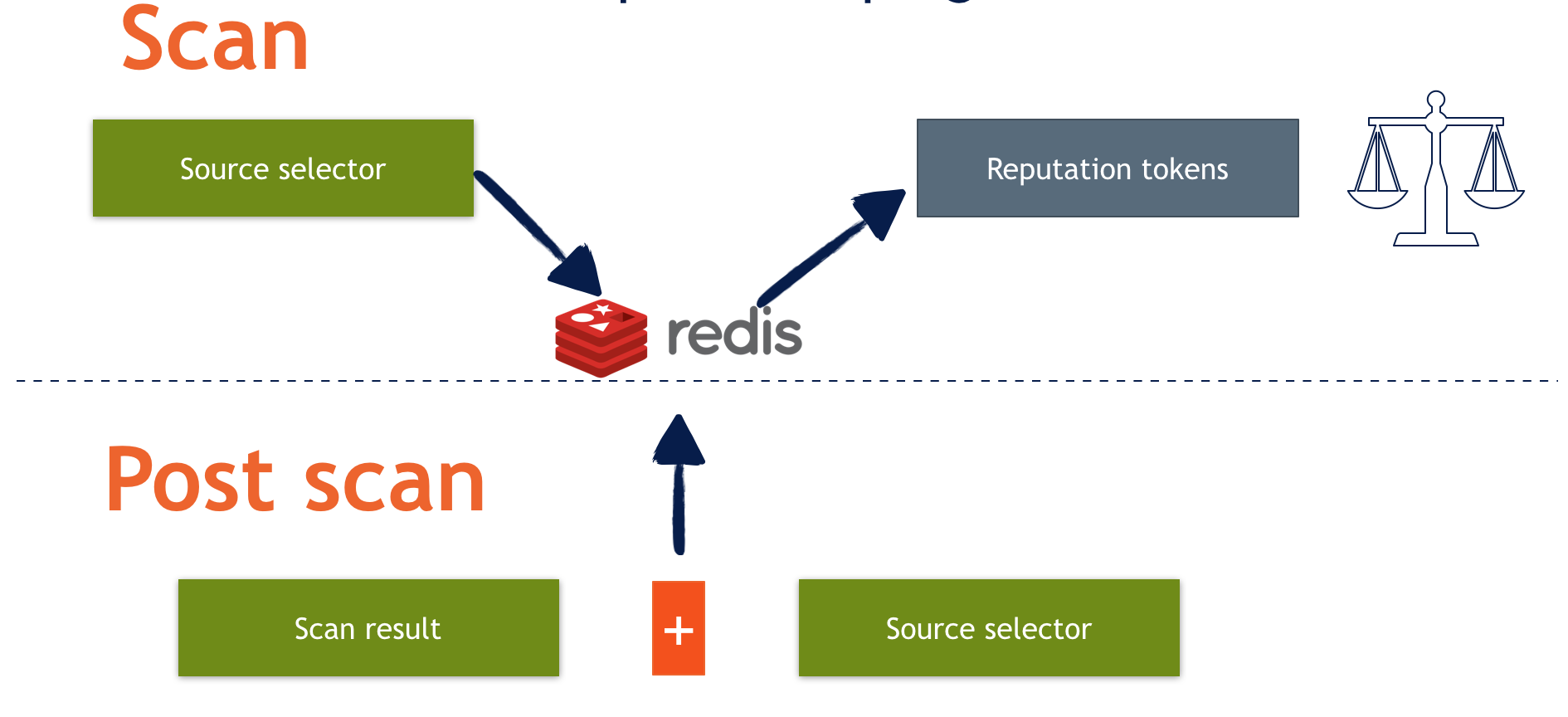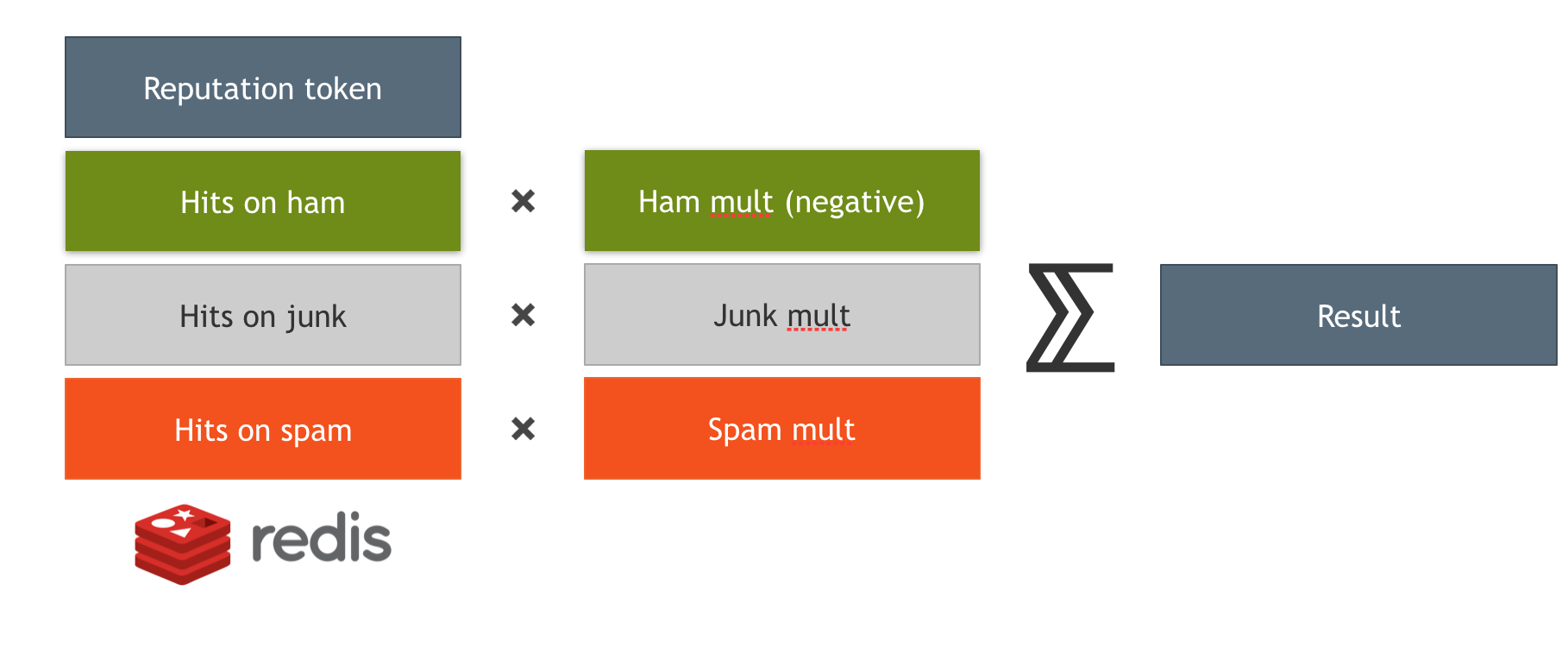Reputation plugin
This plugin is intended to track reputation of different objects and perform adjustments of scores depending on that.
For example, you have a DKIM domain that is proven to be used for spam. Then, this module will let you to reduce negative score of the DKIM_ALLOW symbol (or even add some score).
Or, vice versa, if a domain have high reputation, then DKIM_ALLOW score would have more negative score (like auto whitelisting) and increase score for DKIM_REJECT score accordingly (as a message looks like a phishing).
This module also covers functionality of the following modules:
- ip_score - by means of
ipcomponent - url_reputation - by means of
urlcomponent
Configuration and principles of work
This module like many others requires to define a set of rules. In turn, each rule consists of the following parts:
- Selector configuration - defines what data needs to be extracted from a message and defines data processing logic
- Backend configuration - defines where to store and query reputational tokens, for example, Redis could be used for both storing and extracting whilst DNS can be used as a read-only storage
- Common configuration - defines, for example, a symbol or other generic rule parameters not related neither to backend nor to selector
Here are some examples of the configuration:
# local.d/reputation.conf
rules {
ip_reputation = {
selector "ip" {
}
backend "redis" {
servers = "localhost";
}
symbol = "IP_REPUTATION";
}
spf_reputation = {
selector "spf" {
}
backend "redis" {
servers = "localhost";
}
symbol = "SPF_REPUTATION";
}
dkim_reputation = {
selector "dkim" {
}
backend "redis" {
servers = "localhost";
}
symbol = "DKIM_REPUTATION"; # Also adjusts scores for DKIM_ALLOW, DKIM_REJECT
}
generic_reputation = {
selector "generic" {
selector = "ip"; # see https://rspamd.com/doc/configuration/selectors.html
}
backend "redis" {
servers = "localhost";
}
symbol = "GENERIC_REPUTATION";
}
}
You also need to define the scores for symbols added by this module:
# local.d/groups.conf
group "reputation" {
symbols = {
"IP_REPUTATION_HAM" {
weight = 1.0;
}
"IP_REPUTATION_SPAM" {
weight = 4.0;
}
"DKIM_REPUTATION" {
weight = 1.0;
}
"SPF_REPUTATION_HAM" {
weight = 1.0;
}
"SPF_REPUTATION_SPAM" {
weight = 2.0;
}
}
}
The picture below demonstrates how reputation tokens are being processed:

Backends configuration and principles of work
Selectors provide so called tokens for backends. For example, in case of IP reputation, that could be asn, ipnet and country. Each token is mapped to some key in the backend. If we talk about Redis backend, then there is a concept of buckets. Each bucket has a set of counters that represents count of messages with some specific action:
- number of spam messages
- number of ham messages
- number of probable spam (junk) messages
Score might also be considered when filling these buckets. Each bucket has also two more attributes:
- time window;
- score multiplier;
Each buckets uses discrete windows of the specified time. By default, there are two buckets defined (for Redis):
buckets = [
{
time = 1h,
name = '1h',
mult = 1.5,
},
{
time = 1d,
name = '1d',
mult = 1.0,
}
];
Upon bucket lookup, you have the following attributes:
- Number of messages of the each class (let’s say
h,s,j) - Bucket score (e.g.
1.5for short term bucket) - Combination formula defined in the selector:

Selector types
There are couple of pre-defined selector types, specifically:
- SPF reputation -
spfselector - DKIM reputation -
dkimselector - IP, asn, country and network reputation -
ipselector - URLs reputation -
urlselector - Generic reputation based on selectors framework -
genericselector
All selector types but generic requires no explicit configuration. Generic selector requires a selector attribute to be set. For the advanced configuration of the selectors, you can check the source code of the module.